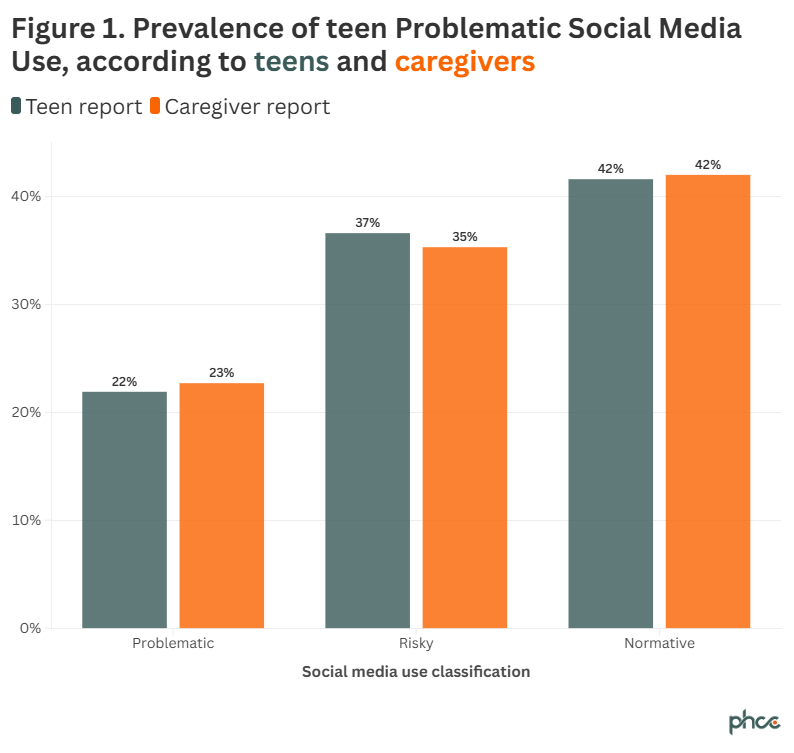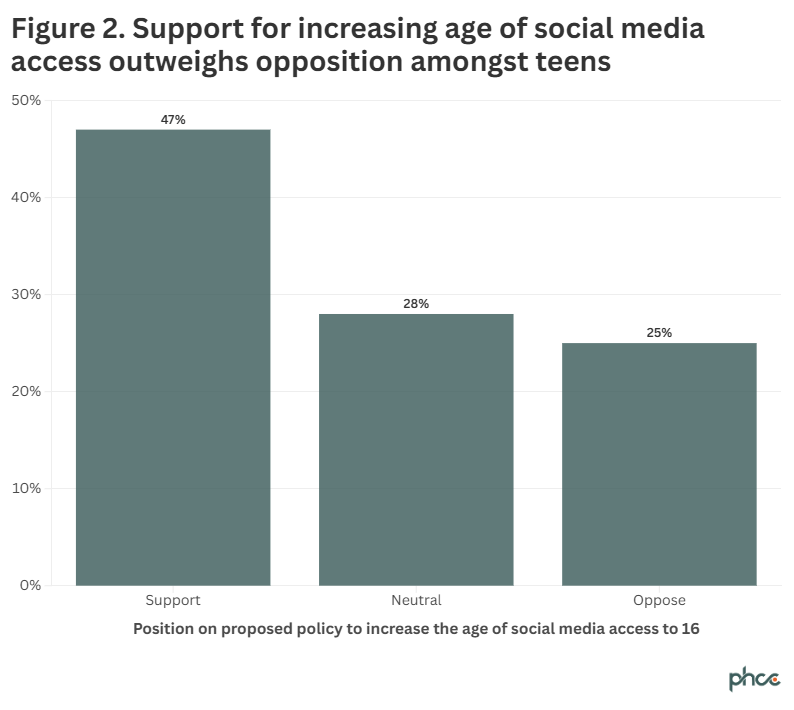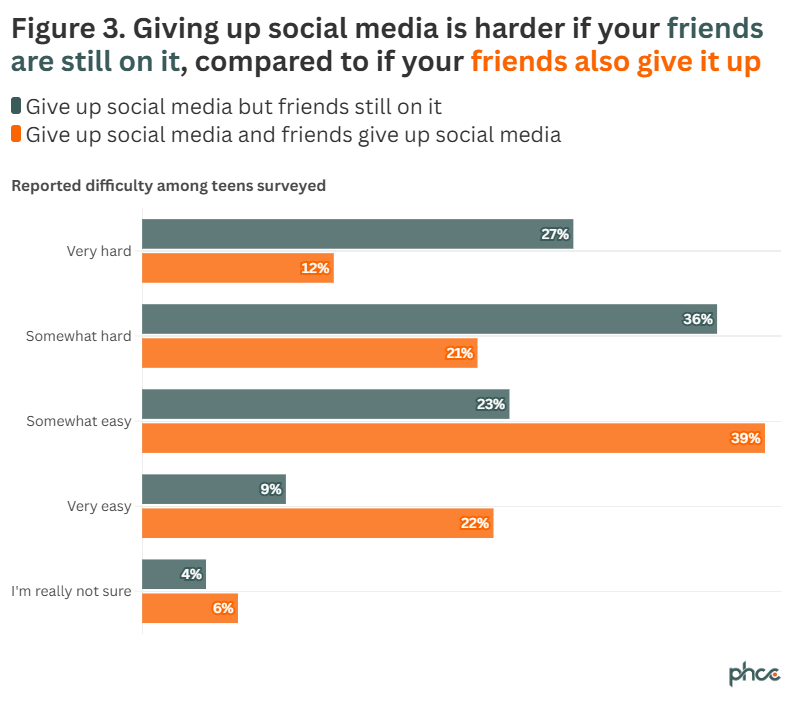Summary
Social media use among New Zealand teens is almost universal, with most spending several hours a day on these platforms. Yet despite its normalisation, our research shows that a substantial proportion of teens meet the criteria for problematic use, which is represented by patterns of engagement that mirror addictive-like behaviours. Half of the teens surveyed felt they were given access to social media too young, and support for a minimum age of 16 years was strong. Importantly, nearly four in ten said they wish social media had never been invented.
As New Zealand considers an age restriction of 16 years, the teens in the survey provided clear views on what would help if a social media age restriction was introduced. They called for safe, supervised online spaces for younger users, more offline opportunities to connect, and greater guidance for parents and schools to support them through the transition.
Social media use is now a normal part of the daily lives of young New Zealanders. Over recent months, we surveyed 533 caregivers of 10–17-year-olds and 540 teens aged 13-17 to better understand how social media use is shaping youth experiences in Aotearoa New Zealand (NZ) in 2025 and what we could do about it (see Appendix for survey details).
Early and frequent use
Overall, 90% of teens reported using social media. Most (62%) began between the ages of 10 and 13 years, a critical time for brain development, identity formation, and emotional regulation. The average amount of time spent on social media was 2.5 hours per day; however, 32% said they spent at least five hours daily on these platforms.
These findings are important as a 2022 meta-analysis found that every additional hour spent on social media was associated with a 13% increase in the risk of depression among adolescents.1
The opportunity cost of time on social media
While we tend to focus on the harms from time spent on social media and the content being viewed there, we often forget to consider what social media displaces. Almost half (49%) of teens surveyed said that social media disrupts daily activities, including chores, homework and schoolwork, spending time with the family, and sleep.
Problematic social media use common in NZ teens
While research into the harms of social media use in young people is often criticised for relying heavily on ‘hours per day’, problematic social media use, which describes patterns of use that mirror addictive-like behaviours, provides us with more information about how social media is interfering with various domains of wellbeing. Participants in our survey completed the Social Media Disorder scale, which includes questions on how often individuals find themselves preoccupied by social media, or lying to or arguing with others about their social media use.2
Concerningly, 22% of teens in our teen survey met the criteria for problematic social media use. Among girls, the figure was one in four. Over a third fell into the “risky” category, leaving only 42% of young people whose use could be considered “normative.”
While these findings are consistent with international evidence, it is important to note that problematic social media use has consistently been linked with sleep issues,3 loneliness,4 depression, anxiety, stress,5 decreased attention and increased impulsivity,6 with a 2025 study showing that high or increasing trajectories of addictive social media use (and mobile phone use or video games) are associated with suicidal behaviours and ideation, and worse mental health.7

Are we giving access to social media too young?
When asked to reflect on their own experience of social media, half of the teens surveyed said they had access to social media too young in life, with nearly four out of ten (39%) saying they wished social media had never been invented. Support for the proposed policy to increase the age of social media access to 16 years was also strong (47%), in contrast, only 25% opposed the restriction. Support for age restrictions was greater still in caregivers, at 77%. Further, when asked what support caregivers need to help them manage their child’s social media use, a policy to increase the age of access to 16 years was the most cited solution (56%).

It’s easier together
We also asked respondents how they would feel about giving up social media. First, they were asked how they would find it if they had to give up social media today while their friends continued to use it. Then they were asked how they would feel if they had to give it up and all their friends had to as well. We found that the proportion of teens who said it would be easy to give up social media almost doubled when their friends also had to give it up (61%) compared with when they had to give it up alone (32%).

Recommendations
As the NZ Government considers introducing a minimum social media age of 16, it is important to plan how best to support young people through this transition, particularly the 22% who already exhibit problematic patterns of use. Encouragingly, young people themselves have ideas about what might help.
Nearly half (49%) said they would like access to safe, supervised online platforms designed specifically for younger teens. Many also wanted school-based education to help them transition away from social media (44%), and practical guidance for parents on how to support them through this process (39%).
Interestingly, young people also pointed to the need for offline opportunities, including more extracurricular activities outside regular school hours (39%) and more community spaces where they could spend time with minimal adult supervision (33%). These insights underscore that reducing social media isn’t simply about restriction but also about providing opportunities for young people to meet their social needs, while supporting them through a potentially difficult period of transition.
While there are arguments that legislation may not be necessary, our findings indicate that both parents and teens are seeking clear rules and policy action to support responsible social media use.
What this Briefing addsNew survey data suggest many New Zealand teens meet the criteria for problematic and risky social media useFindings indicate strong support for a minimum social media access age of 16 years among both caregivers and teensOffers practical insights into what young people say they would need to be supported if an age restriction were introducedImplications for policy and practiceIf introducing a minimum social media age of 16, the government must plan how best to support young people through this transition, especially those who may find the transition particularly difficult due to problematic useInvestment is needed in creating safe online and offline spaces for young people to connectEducation for both schools and parents is needed to prepare teachers and caregivers to support teens to safely transition off social media
Authors details
Dr Samantha Marsh, Senior Research Fellow, General Practice and Primary Healthcare, School of Population Health, Waipapa Taumata Rau | University of Auckland
Dr Amber Young, School of Pharmacy, Ōtākou Whakaihu Waka | University of Otago
Claire Reid, School of Psychology, Waipapa Taumata Rau | University of Auckland
Dr Joanna Chu, Social and Community Health, School of Population Health, Waipapa Taumata Rau | University of Auckland
Acknowledgements
The teen survey and caregiver survey were funded by Smartphone Free Childhood NZ and the Freemasons Foundation, respectively.
Appendix: Survey details
Caregiver survey:
The caregiver survey was conducted between the 17th and 26th of September 2025 and included 533 New Zealand caregivers of children aged 10–17 years. Participants were drawn from Horizon Research’s two online panels and an additional third-party research panel. The sample was predominantly female (67.2%) and reasonably representative of the Māori (17.6%) and Pacific (9.4%) population in New Zealand.
The survey had a maximum margin of error, at a 95% confidence level of ±4.2% overall.
Teen survey:
The teen survey was conducted between the 21st and 28th of October 2025 and included 540 young people aged 13–17 years. Participants were drawn from Horizon Research’s two online panels and an additional third-party research panel. Overall, 61.9% of the sample were male, and 17.6% and 8.9% identified as Māori and Pacific, respectively. The total sample was weighted by age and gender using Stats NZ Census data.
The survey has a maximum margin of error, at a 95% confidence level of ±4.2% overall.

